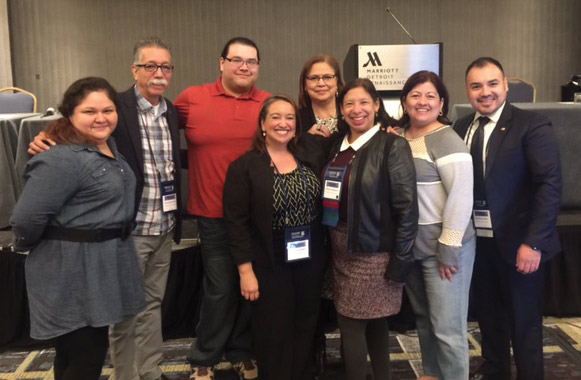
How the Department of Educational Leadership and Policy Studies is bringing quality doctoral education to rural communities


Twice a week, eight education professionals gather together in a Southwest Texas Junior College classroom in Uvalde, Texas in front of a large screen. Through the screen, they are virtually transported to the UTSA Main Campus nearly 90 miles away into a class that is taught alongside other graduate students physically on campus.
These professionals, however, are more than just principals, administrators, teachers, and higher education administrators. They are members of the third Wintergarden cohort, an off-campus doctoral program offered through the College of Education and Human Development’s Department of Educational Leadership and Policy Studies (ELPS).
“We are one of the few, if not the only, off-campus doctoral programs in the university,” said Dr. Mariela Rodriguez, associate professor in ELPS and co-creator of the program. “Through this program, we wanted to extend our teaching outside our walls.”

The program was developed over a five-year period after discovering a need for a high-quality doctoral program in the Wintergarden area, which is comprised of several Southwest Texas cities including Uvalde, Del Rio, Eagle Pass, Crystal City, Asherton, and Carrizo Springs. The curriculum for the program was uniquely designed to fit the needs of educators and administrators that serve the historically underrepresented region.
“The Wintergarden doctoral program is the same doctoral program that the students take on campus,” said Rodriguez. “The only difference is that the Wintergarden program does not have electives. We purposefully selected courses in our catalog under the ELPS designation because of the specificity of working with culturally and linguistically diverse students in the Wintergarden region of Texas.”
Like the department’s award-winning master’s degree program, the Urban School Leaders Collaborative, the Wintergarden doctoral program focuses on the preparation of socially just educational leaders and advocates.
“What grounds our pedagogy is the social justice aspect of it,” said Dr. Encarnacion Garza, ELPS professor and co-creator of the program. “We focus a lot on self-inquiry and on developing the self, to help them understand who they are as leaders and educators.”
The small class size provides a space for the students to have open and self-reflective conversations. This past November, all eight members of the third cohort presented their research during the University Council for Educational Administration’s (UCEA) annual conference.
“We do have very tense conversations, but it is through these conversations that we start making meaning out of life,” said Dr. Juan Manuel Niño, assistant professor in ELPS. “There is a familial aspect among the cohort. The students are able to feel more open and really take ownership of the material and reflect on the content that is being delivered. I think that is what makes the difference.”
During the summer and occasionally throughout the fall and spring semesters, the Wintergarden students will take face-to-face classes on Saturdays in the same teleconferencing classroom in Uvalde, Texas. This was made possible through a Memorandum of Understanding established between the college and UTSA, facilitated by then-Department Chair, Dr. David Thompson.
“Southwest Texas Junior College, the Uvalde campus, has been so generous to us,” said Rodriguez. “They offer us a choice of the dates and times of their lab room first before they offer it to their faculty. We have an amazing agreement with them for eight years.”
The travel to and from the Wintergarden area is not easy, Niño said, but the students’ transformation makes it all worth it.
“It would have been easier to have the students come to us rather than us go to the students, but we believe in social justice and we need to align that research and scholarship with our service,” said Niño. “We have people who have contacted us very informally about when we start recruiting for the next cohort. They see the difference in their colleagues themselves in how they practice and how they teach, and they want to be a part of it.”
Since its inception in 2010, the program has boasted a 100% graduation rate with the first Wintergarden cohort. Many of the graduates have gone on to pursue higher leadership positions in their school district or teach at the local community college, making a difference in lives of the students in the Wintergarden community.
“This program is an opportunity for us to do the work that we say we do, social justice work,” said Garza. “To me, it’s important to do this kind of outreach in an area that has been historically ignored. That’s important. That’s social justice. If we ignore it, then we continue to be part of the system that oppresses certain areas because they are not immediately beneficial to the system. We are giving educational opportunities, like earning a doctorate, to people who would normally not have these opportunities.”